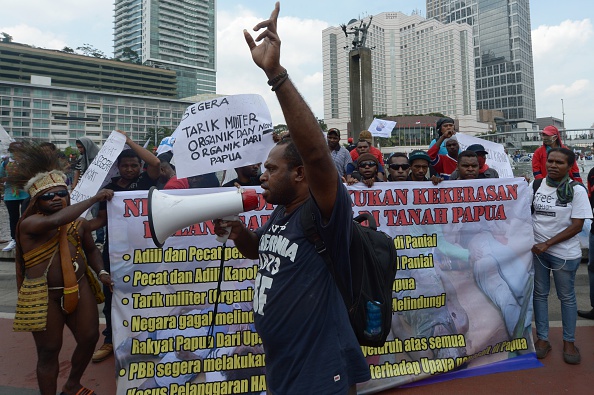
The vivid images that emerged from Indonesia’s Papua province this week are pretty gruesome: teenage boys in school uniforms lie in a pool of blood, surrounded by shell-shocked residents. They are a grim reminder of the ongoing human-rights abuses in the country’s easternmost corner, wracked by a low-level armed separatist movement and heavy-handed military crackdown for about half-century.
On Monday, five high school students, aged 17 to 18, died in the town of Enarotali after security forces allegedly shot at a crowd of about 800 Papuans — many of whom were pupils — protesting on a soccer field, not far from the military and police offices. At least 17 civilians were wounded, including women and children. A sixth victim died on Tuesday, Papuan media reported.
The ill-fated protest was sparked by a brawl between troops and local residents, including children setting up Christmas decorations, shortly after midnight — it ended with a 12-year-old boy being beaten by rifle butts and stones thrown at the military personnel. The U.N. Office of High Commissioner for Human Rights, Human Rights Watch (HRW) and Amnesty International have since called for an independent investigation into the deadly shooting.
The killings raise doubt on the commitment of new Indonesian President Joko Widodo, popularly known as Jokowi, whose election victory has buoyed hopes that the world’s largest Muslim majority nation may finally address rights abuses, self-determination grievances and economic inequality — issues that have long plagued the resource-rich provinces of Papua and West Papua.
However, the most recent shooting is “one of hundreds” of rights-abuse cases documented by HRW over the past 15 years in the Papua region, says Andreas Harsono, the group’s Indonesia researcher. “None of these have been resolved. If anyone is ever put on trial, he would be sent to jail for a few months, but no military men nor policemen have ever been fired because of human-rights violations in Papua.” Indonesian police and military have denied involvement in the Monday shooting — the army chief of staff even suggested the Papuan rebels were behind the incident.
Jokowi, who traveled to Papua and West Papua during parliamentary and presidential campaign seasons, has shown plenty of goodwill gestures to the troubled region. In a June visit, the then presidential candidate told an adoring crowd of his family’s close affinity to the Papuans’ homeland. “My wife was named Iriana because her grandfather was a teacher who was deployed to the then named Irian Jaya for quite some time,” he said, referring to the old provincial name of Papua.
Just weeks after his election victory, Jokowi met with Papuan politicians and leaders and promised to boost dialogue between Jakarta and the two provinces. In October, the President made Yohana Yembise his Minister for Women’s Empowerment and Child Protection, the first Papuan woman appointed to the Cabinet.
The Papua region, which has some of the world’s largest copper and gold mines, is the only remaining area plagued by armed separatist conflicts in Indonesia. (East Timor voted for independence in 1999 and Aceh rebels reached a peace deal with Jakarta in 2005.) While the two Papuan provinces are currently a virtually no-go zone for foreign reporters — two French journalists making a documentary on Papua’s insurgency were arrested last August, jailed for more than two months and later deported — Jokowi has spoken about lifting media restrictions.
Conversely, though, Jokowi has been heavily criticized not only for naming a hard-line retired general, Ryamizard Ryacudu, as Defense Minister, but also for supporting an increased military presence in the region, including a plan to establish a new military command. Indonesian rights activists say the higher number of security forces could trigger even more violence in Papua.
And like the Tibetans, Uighurs and Mongolians in China’s periphery regions, Papuans are also worried of the influx of new migrants into their homeland — a number that is likely to increase if the new Transmigration Minister could push a migration program to Papua from other islands, especially the densely populated Java. “It is seen as an attempt to Indonesianize Papua,” Harsono tells TIME.
One day after the shooting, in an International Human Rights Day event in the southern Javanese city of Yogyakarta, Jokowi reiterated his human-rights commitment. “The government is paying attention and committed not only to resolve past human-rights abuses but also to prevent rights violations from being repeated in the future,” he said
That may be reassuring to some, but Papuans and human-rights activists are demanding more concrete actions, not just promises, from their new leader. “After nearly two months in power, nothing has been realized yet,” Harsono says about Jokowi. “There have been no significant changes.”
More Must-Reads from TIME
- Your Vote Is Safe
- The Best Inventions of 2024
- How the Electoral College Actually Works
- Robert Zemeckis Just Wants to Move You
- Column: Fear and Hoping in Ohio
- How to Break 8 Toxic Communication Habits
- Why Vinegar Is So Good for You
- Meet TIME's Newest Class of Next Generation Leaders
Contact us at letters@time.com